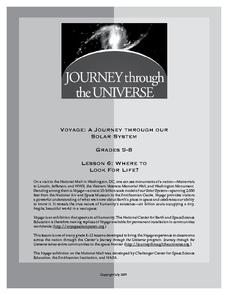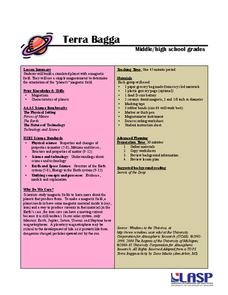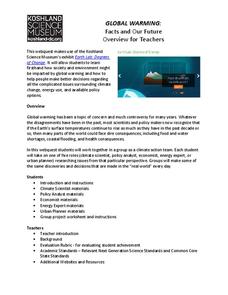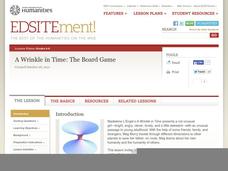Curated OER
Please Ex-Planet!
What is most useful about this lesson plan is the "Student Explanet Worksheet," a set of instructions for collaborative groups to use to collect information about an assigned planet. After students have researched and organized their...
Journey Through the Universe
Where to Look For Life?
Every year we discover new planets including more than 1,000 in 2016 alone. Will we ever find life on another planet? The lesson includes two activities to help scholars understand this concept. First, they analyze the temperature range...
Population Connection
The Peopling of Our Planet
How many people live on the planet, anyway? The first resource in a six-part series covers the topic of the world population. Scholars work in groups to conduct research and make population posters after learning about the global...
University of Colorado
Terra Bagga
One way to identify possible volcanic activity on other planets is by testing the planet for magnetism. A science lesson begins with pupils constructing their own planet from a dead battery, magnets, paper, and tape before labeling the...
Green Planet Solar Energy.com
Order of Operations 2 - More Practice!
Your learners will get plenty of practice calculating expressions remembering to use order of operations in this worksheet.
Captain Planet Foundation
Which Plant Is Which?
Learn about dichotomous keys, plant identification, and how to care for the planet with a lesson that includes several hands-on and innovative activities. Kids go on a plant scavenger hunt and classify the plants that they find...
NASA
Soda Straw Rockets
Three, two, one, blast off to a better understanding of force and motion with this exciting science lesson! Beginning with a discussion about rockets and gravity, young scientists go on to complete a series of worksheets about net forces...
Captain Planet Foundation
Rotting Away
What happens at the end of a plant's life cycle? Show kids the natural way that plants show that they're decomposing, as well as the importance of compost, with a lesson about living organisms. After reading Log Cabin by Anne Schreiber,...
Captain Planet Foundation
Sense of Place
Explore the five senses with a kindergarten instructional activity on gardening. After taking a walk through the class garden, kids note what they see, hear, feel, taste, and smell, and then decide what is living in the garden versus...
Laboratory for Atmospheric and Space Physics
Planetary Distances on the Playground
There's no need to stay inside; get out of the classroom and create a scaled map of the solar system on your playground field! In collaborative groups, scholars identify the distance between the sun and other planets, place planet...
Curated OER
Making Regolith
You may not be able to take a field trip to the moon, but that doesn't mean your class can't study moon rocks. Using graham crackers as the moon's bedrock and powdered donuts as micrometeorites, young scientists simulate the creation of...
PBS
Lessons - Feeling Hot, Hot, Hot!
Volcanoes are among the most spectacular geological features on the planet. Jump into an exploration of these amazing phenomenon with this multimedia lesson series. Working collaboratively in small groups, young scientists view videos...
NASA
Collecting Electromagnetic Radiation
Astronomy is literally over your head, but this lesson will explain how we study it. Young scientists make telescopes, calculate and compare the light gathering power of lenses, and simulate detection of infared radiation. Materials...
NASA
The Science of the Sun
There's more to that glowing ball of light in sky than most children realize. From the overall structure of the solar system, to the changing of the seasons, these hands-on lessons open the eyes of young scientists to the important role...
Curated OER
Changing Planet: Infectious Diseases Classroom Activity
Here is a different approach: emerging epidemiologists first go home to interview family on the topic of infectious disease. Then they come to class and view a video and PowerPoint that explore how climate change may increase the...
New York State Department of Environmental Conservation
Adaptations – Designs for Survival
What's the difference between behavioral adaptations and physical adaptations? Learn about the various ways that organisms adapt to their environment with a worksheet about the creatures of the Hudson River.
Deliberating in a Democracy
Recycling
How often have you passed by a recycling container in your school? Scholars research the issue of recycling in the ever-changing global world. Using documentation and video evidence, they form their own opinions on recycling and how it...
Voyage Solar System
Round and Round We Go — Exploring Orbits in the Solar System
Math and science come together in this cross-curricular astronomy lesson plan on planetary motion. Starting off with a hands-on activity that engages the class in exploring the geometry of circles and ellipses, this lesson plan then...
Curated OER
Neither Wind Nor Rain
Here is another in the interesting series of lessons that use the special State Quarters as a learning tool. This one uses the North Dakota State Quarter. During this lesson, your class learns about the different patterns of erosion, and...
Space Awareness
The Intertropical Convergence Zone
Young scientists know it is hotter along the equator, but why is it also rainier? Through the process of completing two experiments and a worksheet, scholars discover the answer is the intertropical convergence zone. First, they...
Curated OER
Fossil Kit I - Lesson Plan
Here is a 14-page lesson plan that deftly outlines a wonderful educational experience for your youngsters. In it, students learn about a variety of animals that have left behind clues of their existence in fossil form. Many excellent...
National Academy of Sciences
Global Warming: Facts and Our Future
According to the United Nations, climate change affects every country on the planet. This research project encourages scholars to explore the factors that affect climate change from different perspectives: climate scientist, policy...
Laboratory for Atmospheric and Space Physics
Growing Up With A Mission
New Horizons began its journey to Pluto in 2006. Ten years later, it continues its mission. In that time, scholars have surely grown, but how much more will they grow by the time New Horizons reaches its destination? Find out with an...
National Endowment for the Humanities
A Wrinkle in Time: The Board Game
Tackle some big questions about A Wrinkle in Time by Madeleine L'Engle with a board game project. As learners brainstorm for and complete their board games, they consider what helps and hinders Meg on her journey and why she succeeds in...
Other popular searches
- Worksheets Planets Diagrams
- Worksheets Planets 1 2 Grade
- Worksheets Planets K
- Nine Planets Worksheets
- Worksheets Planets 3 4 Grade
- Stars and Planets Worksheets
- Planets Worksheets
- The Planets Worksheets
- 8 Planets Worksheets

























